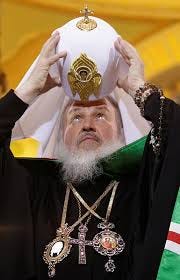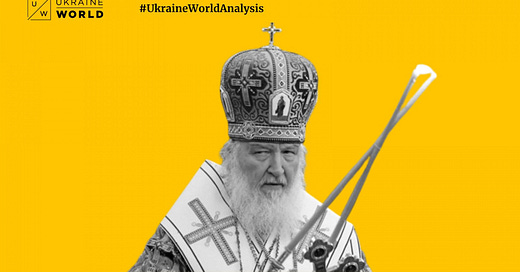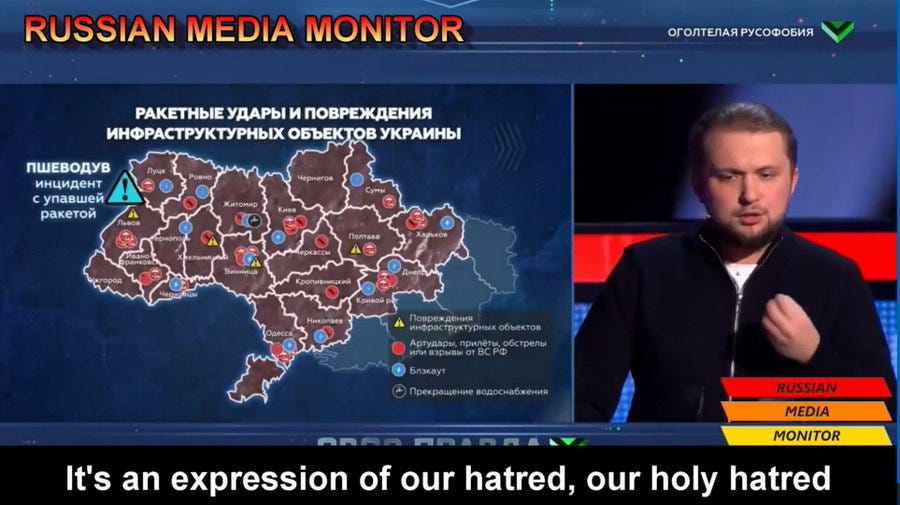Nov 23- Ukraine World- What is Russia’s "De-Satanization" Rhetoric About?
Published on Ukraine World, November 1, 2022
What is Russia’s "De-Satanization" Rhetoric About?
UkraineWorld spoke to Dmytro Horyevoy, religious scholar, director of the Center for Religious Security NGO, November 1, 2022
Key points — in our brief, #UkraineWorldAnalysis:
1. On the development of Russia's "de-Satanization" rhetoric
Russia's rhetoric about "de-Satanizing" Ukraine is not aimed at developing the concept that there are Satanists in Ukraine, so much as raising the degree of propaganda hysteria and trying to provide the Russian military with additional motivation. Religious motivation is the most powerful.
The categorization of the war as religious shows that the Russian army is having a hard time with motivation, and they do not understand what they are fighting for. If we recall the year 2014, there were attempts to protect "Russian-speakers" or the believers of the Orthodox Church of the Moscow Patriarchate. But now the authority of the Moscow Patriarchate is zero.
2. On the concept of the "Russian world"
Russians are not ready to fight for Patriarch Kirill`s religious concept of the "Russian world".
He formulated the doctrine of the Russian world at the meeting of the Russian People's Council in the fall of 2009. It views the Russian world as a separate civilization of Russian speaking people, who consider themselves as part of Russian culture and share a common Russian version of history.
In Patriarch Kirill's view, there is a romanticized fascination with Samuel Huntington's "clash of civilizations" — civilizations rooted in religion everywhere except for the West.

3. On the roots of Russian Orthodox fundamentalism
Any fundamentalism opposes the modern order. One of the drivers of political modernity is the USA. Both Russian Orthodox and Islamic fundamentalisms are supporters of anti-Western movements.
Today's Orthodox fundamentalism appeals to a tradition that never existed. Monasticism existed in Russia long before the Bolshevik regime. However, the real life of monks differed from what was written in the novels which serve as the inspiration for today's fundamentalists.
The Soviet authorities destroyed the institution of monasticism, and accordingly impeded the tradition.
During the times of perestroika, monasteries were created, but there was no understanding of how monks really lived before the Soviets. They reconstructed this monastic life, but not in how people really lived but how it was written in books.That is why in Russia there are such trash books as Confession of a Novice, which does not reveal the basics of religious life.
Russian fundamentalism appeals to ancient traditions — not to the traditions as they were, but to their idea of these ancient traditions.

4. On how to render judgment upon Patriarch Kirill
There is a problem of condemning Patriarch Kirill at the church level rather than at the secular level. It is difficult to create a church court for Kirill. Formally, all official documents and creeds are political, not religious.
The only exception is his recent statements that those Russian soldiers who die in Ukraine will be absolved of their sins. This is heresy. There is a verse in the Bible: Greater love hath no man than this, that a man lay down his life for his friends [John 15:13]. But this is about self-sacrifice, not the aggressive killing of others.
Patriarch Kirill is a political figure in a cassock, with a beard and icons. He must bear political responsibility as a propagandist who has incited enmity and encouraged violence. Therefore, it is difficult to say that the Russians have a theology of war, because this would require a holistic vision.
According to their internal documents, if a military conflict begins on their canonical territory, and they consider Ukraine to be their canonical territory, they are obliged to convene an urgent meeting and determine the type of conflict. They do not have the right to support the aggressor, but must side with the victim. Russian Orthodox fundamentalism is therefore a matter of random propagandist statements rather than a holistic theological view.


This material was prepared with financial support from the International Renaissance Foundation.
DARIA SYNHAIEVSKA, ANALYST AND JOURNALIST AT UKRAINEWORLD
DMYTRO HORYEVOY, RELIGIOUS SCHOLAR, DIRECTOR OF THE CENTER FOR RELIGIOUS SECURITY NGO
Please visit Ukraine World for analysis, stories and podcasts.






